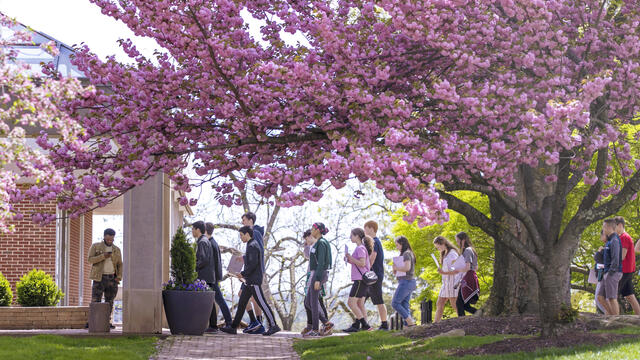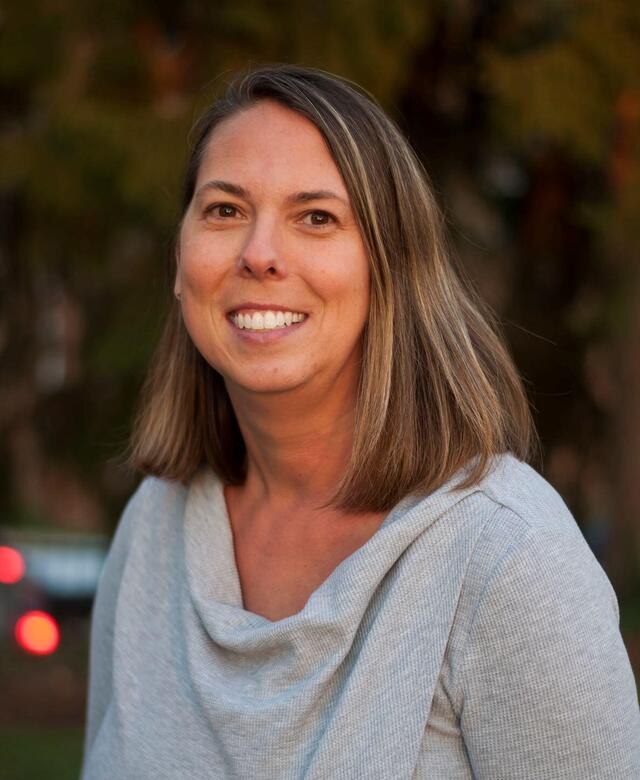McDaniel Admissions Dean joins admissions leaders nationwide in signing a statement of care
Heidi Reigel, Dean of Admissions at McDaniel College, is among the more than 315 admissions leaders from across the United States who signed “Care Counts in Crisis: College Admissions Deans Respond to COVID-19.” This collective statement describes what college admissions offices value and expect—and don't expect—from students during the pandemic.

McDaniel has taken a personalized approach to admissions and strives to make the college search process as easy and stress-free as possible.
Heidi Reigel '97, Dean of Admissions at McDaniel College, is among the more than 315 admissions leaders from across the United States who signed “Care Counts in Crisis: College Admissions Deans Respond to COVID-19.” This collective statement describes what college admissions offices value and expect—and don't expect—from students during the pandemic.
Even prior to COVID-19, McDaniel has taken a personalized approach to admissions.
According to Reigel, “At McDaniel, we really try to take the time to know each applicant. That’s why we use a holistic review to assess a student’s life beyond their GPA and test scores. Our hope is to make the college search process as easy and stress-free as possible.”

Heidi Reigel '97, Dean of Admissions
“What we are really looking for in a college application are the things that help to paint a picture of who the student is,” said Reigel. “For example, we are not just looking at a student’s grades, but also the type of courses that the student chose to take. We also want to learn more about a student’s character, work ethic and accomplishments. It’s about whether a student has contributed in a meaningful way outside of the classroom, not a magical number or mix of extracurricular activities.”
Click here to learn more about McDaniel Admissions and how to apply to McDaniel.
Read the full "Care Counts in Crisis: College Admissions Deans Respond to COVID-19" statement here.
Per the statement:
“We are keenly aware that students across the country and the world are experiencing many uncertainties and challenges. We primarily wish to underscore our commitment to equity, and to encourage in students self-care, balance, meaningful learning, and care for others.”
1. Self-care. Self-care is of high importance, especially in times of crisis. We recognize that many students, economically struggling and facing losses and hardships of countless kinds, are simply seeking to get by. We also recognize that this time is stressful and demanding for a wide range of students for many different reasons. We encourage all students to be gentle with themselves during this time.
2. Academic work. Your academic engagement and work during this time matter to us, but given the circumstances of many families, we recognize that you may face obstacles to academic work. We will assess your academic achievements in the context of these obstacles. In addition, we will assess your academic achievements mainly based on your academic performance before and after this pandemic. No student will be disadvantaged because of a change in commitments or a change in plans because of this outbreak, their school’s decisions about transcripts, the absence of AP or IB tests, their lack of access to standardized tests (although many of the colleges represented here don’t require these tests), or their inability to visit campus. We will also view students in the context of the curriculum, academic resources, and supports available to them.
3. Service and contributions to others. We value contributions to one’s communities for those who are in a position to provide these contributions. We recognize that while many students are not in this position because of stresses and demands, other students are looking for opportunities to be engaged and make a difference. This pandemic has created a huge array of needs, whether for tutoring, contact tracing, support for senior citizens, or assistance with food delivery. We view responding to these needs as one valuable way that students can spend their time during this pandemic.
We also value forms of contribution that are unrelated to this pandemic, such as working to register voters, protect the environment, combat racial injustice, and inequities or stop online harassment among peers. Our interest is not in whether students created a new project or demonstrated leadership during this period. We, emphatically, do not seek to create a competitive public service “Olympics” in response to this pandemic. What matters to us is whether students’ contribution or service is authentic and meaningful to them and to others, whether that contribution is writing regular notes to frontline workers or checking in with neighbors who are isolated. We will assess these contributions and services in the context of the obstacles students are facing. We also care about what students have learned from their contributions to others about themselves, their communities, and/or their country (Please see Turning the Tide for additional information about the kinds of contributions and service we value). No student will be disadvantaged during this time who is not in a position to provide these contributions. We will review these students for admissions in terms of other aspects of their applications.
4. Family contributions. Far too often there is a misperception that high-profile, brief forms of service tend to “count” in admissions while family contributions—which are often deeper and more time-consuming and demanding—do not. Many students may be supervising younger siblings, for example, or caring for sick relatives or working to provide family income, and we recognize that these responsibilities may have increased during these times. We view substantial family contributions as very important, and we encourage students to report them in their applications. It will only positively impact the review of their application during this time.
5. Extracurricular and summer activities. No student will be disadvantaged for not engaging in extracurricular activities. We also understand that many plans for summer have been impacted by this pandemic, and students will not be disadvantaged for lost possibilities for involvement. Potential internship opportunities, summer jobs, camp experiences, classes, and other types of meaningful engagement have been canceled or altered. We have never had specific expectations for any one type of extracurricular activity or summer experience and realize that each student’s circumstances allow for different opportunities. We have always considered work or family responsibilities as valuable ways of spending one’s time, and this is especially true at this time.